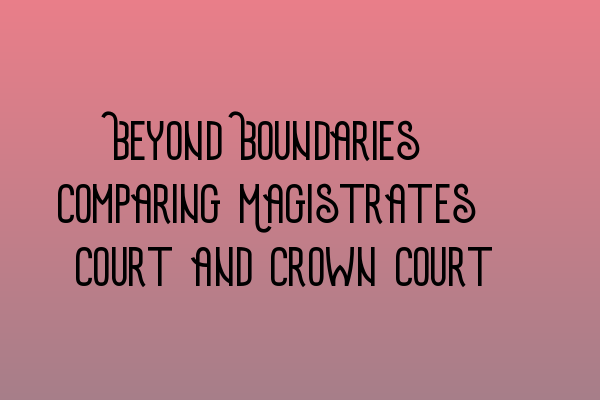Beyond Boundaries: Comparing Magistrates’ Court and Crown Court
Welcome to SQE Criminal Law & Practice Law UK, where we aim to provide you with comprehensive information and insights about the legal system. Today, we delve into the differences between magistrates’ court and crown court proceedings, exploring the nuances that define each jurisdiction. Understanding these boundaries can help defendants, solicitors, and legal professionals navigate the criminal justice system more effectively.
Magistrates’ Court: Quick Overview
Magistrates’ courts are the lower tier of the criminal court system in England and Wales. These courts mainly deal with less serious criminal offenses, such as minor assaults, theft, public order offenses, and traffic violations. Magistrates’ courts play a vital role in the criminal justice system, providing swift justice to the majority of cases.
When a case is brought to a magistrates’ court, the trial is presided over by magistrates, who are laypersons with legal training. These magistrates, also known as justices of the peace, are supported by legal advisors and clerks. In some instances, cases may be heard by a District Judge.
To gain an in-depth understanding of the rules, procedures, and practices in the magistrates’ court, check out our related article on SQE 1 Practice Exam Questions. This resource will help aspiring solicitors prepare for the SQE 1 exam efficiently.
Crown Court: A Closer Look
The Crown Court, on the other hand, is the higher tier of the criminal court system. It deals with more serious criminal offenses, including murder, rape, robbery, and drug trafficking. Cases trialed in the Crown Court usually originate from the magistrates’ court, as they are escalated due to their complexity or severity.
Unlike magistrates’ court trials, cases in the Crown Court are overseen by a judge and a jury. The judge ensures the case proceeds in accordance with the law, while the jury, comprised of twelve individuals, evaluates the evidence presented and determines the defendant’s guilt or innocence.
If you are looking for comprehensive resources to prepare for the SQE 1 and SQE 2 exams, be sure to explore our SQE 2 Preparation Courses and SQE 1 Preparation Courses. These courses provide aspiring solicitors with the knowledge and skills needed to succeed in their professional journey.
A Comparison of Processes and Sentencing
One key difference between magistrates’ court and crown court proceedings is the sentencing authority they possess. In magistrates’ court, the power to impose sentences is limited, with a maximum of twelve months for a single offense and a maximum of six months for multiple offenses. In contrast, the crown court has broader powers, allowing for lengthier custodial sentences, life imprisonment, and the imposition of substantial fines.
The processes within each court also differ. Magistrates’ court cases are typically resolved more swiftly due to their nature, with fewer formalities and pre-trial procedures. Crown court cases, due to their complexity, involve longer preparations, including case management conferences and pre-trial hearings.
To stay updated with important dates regarding the SRA SQE exams, be sure to bookmark our article on SRA SQE Exam Dates. This resource provides you with essential information on exam schedules, allowing you to plan your preparation effectively.
The Importance of Legal Representation
Regardless of the court level, legal representation is crucial for defendants. Solicitors play a pivotal role in preparing and presenting a defendant’s case effectively. They ensure that their clients’ rights are protected, guide them through the legal process, and provide expert advice on the available options.
To enhance your legal expertise and hone your skills as a solicitor, consider participating in our practice mocks for the SQE 1 exam. Our SQE 1 Practice Mocks FLK1 FLK2 will familiarize you with the exam format and help you develop confidence in your abilities.
Conclusion
Understanding the distinctions between magistrates’ court and crown court is essential for defendants, solicitors, and legal professionals alike. By gaining insights into the processes, sentencing powers, and roles of these courts, we can ensure better outcomes for all parties involved.
At SQE Criminal Law & Practice Law UK, we endeavor to provide comprehensive resources and guidance to assist you in navigating the legal system effectively. Stay tuned for more informative articles and updates.
